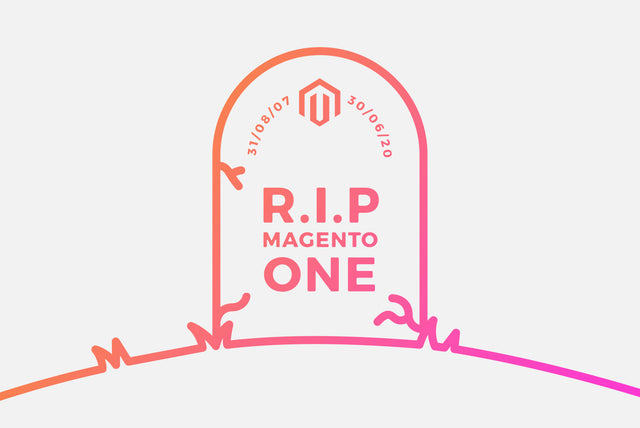Life Officially Ends For Magento 1
It’s been a long time coming, but we’ve finally reached the end of June 2020 and so it is officially time to say goodbye to Magento 1 and turn all attention to Magento 2.
Hopefully you’ve already made the decision about your next steps if your eCommerce store is currently using Magento 1, but don’t panic if you haven’t yet – the platform will continue to function (with the required support) and there is still time to migrate across to Magento 2 or another eCommerce platform.
If you’ve been staying up to date with the latest news from Magento themselves, this information won’t come as a shock to you – the announcement of Magento 2 back in 2015 signalled the sunsetting of Magento 1 and the end of official support for the old platform from June 2020.
The announcement that support will shortly end does not mean that your Magento 1 store will be forced to shut down. Although there won’t be any more security updates or patches for your site, there are still ways to secure your site for the short term while you plan a move across to Magento 2 or another eCommerce platform.
In Magento’s experience, platform upgrades can be a time for innovation and positive digital transformation in organisations, for example looking at features that are working well but also what features need to be improved and support your business goals moving forward whilst giving you a competitive edge. Now is definitely the time to start the conversation with us and your agency – we are both ready to support merchants along what will be a rewarding journey.
You might think that a lack of updates isn’t a massive issue in itself, however, it’s likely that Magento 1 stores will become easy targets for hackers who are aware of the lack of security patches post-June 2020 and will do everything they can to access confidential information or bring down your store. You do of course have a duty of care to your customers, so ensuring their online safety and security should be of paramount importance to your business.
Although Magento 1 will continue to exist as an eCommerce platform, its lack of ongoing support heading into July 2020 onwards leaves it unusable to most sizeable businesses operating online. With that in mind, we have a few suggestions for you if you’re still considering your options at this late stage.
Options For Sites Still On Magento 1
Knowing that your options to remain on Magento 1 are risky and limited, we are firmly of the belief that the only way to guarantee long-term security for your customers is to migrate to a new platform as soon as possible. If you have any concerns about the long-term stability of your business, staying on the original Magento platform is not a viable option.
It’s clear that a move to Magento 2 would make the most sense here – it’s a very similar platform, but now comes with ongoing support and a whole host of new functionality that makes it incredibly appealing to eCommerce stores that are already utilising Magento 1.
Of course you don’t have to move to Magento 2 if you don’t want to – there are plenty of alternatives out there to suit almost any business size or situation such as BigCommerce or Shopware, however, bear in mind that a switch from M1 to M2 is a lot more straightforward thanks to their inbuilt compatibility.
Remember that if you choose to move away from Magento at any time, be aware that you may not be able to take everything with you. What you can take will depend on the platform you choose to move to.
We also understand that the costs involved with any migration may influence your decision, particularly in the light of the hugely damaging COVID-19 global pandemic that has affected millions of people and businesses in the last few months, so it could be the case that sticking with Magento 1 may be your only option for financial reasons.
If that is the case, speak to our team today and we’ll outline the best possible scenario for you in terms of keeping your existing site safe and secure for all users.
Things To Bear In Mind
We feel that it’s important to highlight the fact that replatforming isn’t a process that happens overnight – a complex eCommerce site of any size will take a lot of time and effort to migrate over successfully, so the sooner you set the ball rolling the better.
Leaving your store on Magento 1, a now unsupported and unprotected platform, could end up being a big mistake and cost you thousands of pounds further down the line. We say this not to cause panic, but to ensure you understand the sizable risks your business will face on a daily basis by remaining on an unsupported platform in the long term.
In the words of Joe Ayyoub, Director of Support Operations at Magento, ‘the time to upgrade to Magento Commerce 2 is now’.
Should You Move To Magento 2?
This is the big question, and it’s very difficult to answer without knowing your particular business needs and what you specifically require from your eCommerce solution. From our perspective as an eCommerce agency, we believe Magento is the world’s leading eCommerce platform for good reason and it’s ideally suited to helping you be the best at selling online.
Some of the important updates for Magento 2 that could boost your eCommerce business include:
Improved Performance – Magento 2 has been built in a more efficient way and therefore operates on average 20% faster than Magento 1 stores. This is crucial in achieving more sales as research has shown that customers often give up and leave sites that load slowly. Also, site speed is a factor in achieving a higher rank on search engines like Google.
Streamlined Checkout – The original Magento platform was often criticised for its lengthy checkout process which features six distinct stages. This has been trimmed significantly on Magento 2 with just two stages now required to checkout in full. Again, complex and drawn-out checkout processes are another area that customers have grown frustrated with, so this is a welcome change.
Mobile-Friendliness – With over 60% of all eCommerce transactions coming via smartphones nowadays, it was crucial that Magento 2 could deliver the optimised performance on mobile that Magento 1 was never truly able to provide. All sites built on Magento 2 are mobile-friendly as standard and enjoy greater performance on older smartphones too.
Improved User Interface – Perhaps one of the biggest updates has been to the admin interface in the backend of Magento 2. Navigating around Magento 1 was challenging, especially if you weren’t very technically minded, but the layout of the new Magento 2 admin panel has been reorganised and makes managing your store much easier.
Moving to Magento 2 brings with it more than just long-term store security – it’s an opportunity to evaluate and refresh your online offering. Successful sites should take the chance to tweak their design, make functionality improvements and provide a better user experience.
Tweet this now
Final Thoughts
Any platform migration will come at a price, but the key point here is that remaining on Magento 1 will pose a risk to both you and your customers.
Protecting what you have already worked so hard to build should be your priority, so giving thought to remaining on an outdated platform that is no longer secured and updated regularly is not the best way forward.
If you’re still operating on Magento 1, we recommend that you act with urgency and swiftness to protect your business post-June 2020. Our team has already successfully completed a number of Magento 1 to Magento 2 migrations so you can rest assured you’re in safe hands!
To find out more about the options available to you, get in touch or drop us a message.


